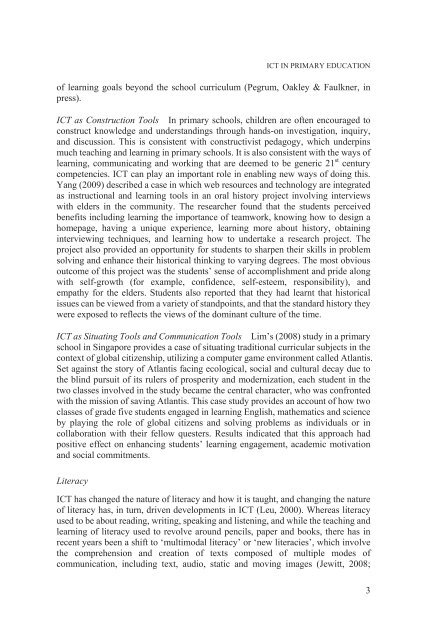1517-creating-holistic-technology-enhanced-learning-experiences
1517-creating-holistic-technology-enhanced-learning-experiences
1517-creating-holistic-technology-enhanced-learning-experiences
Create successful ePaper yourself
Turn your PDF publications into a flip-book with our unique Google optimized e-Paper software.
ICT IN PRIMARY EDUCATION<br />
of <strong>learning</strong> goals beyond the school curriculum (Pegrum, Oakley & Faulkner, in<br />
press).<br />
ICT as Construction Tools In primary schools, children are often encouraged to<br />
construct knowledge and understandings through hands-on investigation, inquiry,<br />
and discussion. This is consistent with constructivist pedagogy, which underpins<br />
much teaching and <strong>learning</strong> in primary schools. It is also consistent with the ways of<br />
<strong>learning</strong>, communicating and working that are deemed to be generic 21 st century<br />
competencies. ICT can play an important role in enabling new ways of doing this.<br />
Yang (2009) described a case in which web resources and <strong>technology</strong> are integrated<br />
as instructional and <strong>learning</strong> tools in an oral history project involving interviews<br />
with elders in the community. The researcher found that the students perceived<br />
benefits including <strong>learning</strong> the importance of teamwork, knowing how to design a<br />
homepage, having a unique experience, <strong>learning</strong> more about history, obtaining<br />
interviewing techniques, and <strong>learning</strong> how to undertake a research project. The<br />
project also provided an opportunity for students to sharpen their skills in problem<br />
solving and enhance their historical thinking to varying degrees. The most obvious<br />
outcome of this project was the students’ sense of accomplishment and pride along<br />
with self-growth (for example, confidence, self-esteem, responsibility), and<br />
empathy for the elders. Students also reported that they had learnt that historical<br />
issues can be viewed from a variety of standpoints, and that the standard history they<br />
were exposed to reflects the views of the dominant culture of the time.<br />
ICT as Situating Tools and Communication Tools Lim’s (2008) study in a primary<br />
school in Singapore provides a case of situating traditional curricular subjects in the<br />
context of global citizenship, utilizing a computer game environment called Atlantis.<br />
Set against the story of Atlantis facing ecological, social and cultural decay due to<br />
the blind pursuit of its rulers of prosperity and modernization, each student in the<br />
two classes involved in the study became the central character, who was confronted<br />
with the mission of saving Atlantis. This case study provides an account of how two<br />
classes of grade five students engaged in <strong>learning</strong> English, mathematics and science<br />
by playing the role of global citizens and solving problems as individuals or in<br />
collaboration with their fellow questers. Results indicated that this approach had<br />
positive effect on enhancing students’ <strong>learning</strong> engagement, academic motivation<br />
and social commitments.<br />
Literacy<br />
ICT has changed the nature of literacy and how it is taught, and changing the nature<br />
of literacy has, in turn, driven developments in ICT (Leu, 2000). Whereas literacy<br />
used to be about reading, writing, speaking and listening, and while the teaching and<br />
<strong>learning</strong> of literacy used to revolve around pencils, paper and books, there has in<br />
recent years been a shift to ‘multimodal literacy’ or ‘new literacies’, which involve<br />
the comprehension and creation of texts composed of multiple modes of<br />
communication, including text, audio, static and moving images (Jewitt, 2008;<br />
3


